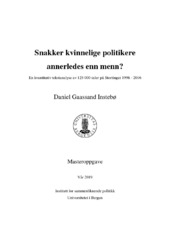| dc.description.abstract | In this thesis, I analyze to what extent the content of speeches from female legislators in the Norwegian parliament differ from their male colleagues with respect to fundamental topics regarding the Norwegian welfare state. Floor speeches is a key institution in the Norwegian parliament where elected representatives can voice their own beliefs, the ideology of their represented party or the concerns of their constituents. It is also an institution in which representatives’ debate over bills and can raise questions about the executives’ policy concerns. I hypothesize that female legislators are driven towards spending more effort in debating policies that have a direct influence on constituents’ welfare compared to their male colleagues. I use a quantitative framework to answer my research question. Using the Talk of Norway dataset, I analyze 125 799 parliamentary speeches from 1998 to 2016 by applying two statistical models called topic modelling and structural topic modelling. With these techniques, I divide the speeches into 140 topics and analyze to what extent gender plays a role in legislative speeches. My analysis is divided into two parts. In the first part I delve into the parliamentary speeches using topic modelling. Here, I identify what constitutes the different topics in the legislative debate. In the second part I use structural topic models to analyze to what extent gender plays a role in speech participation. In my first model I analyze gender separately, and in my second model I use party affiliation and committee membership as controls. My main finding is that female legislators consistently and significantly speak more about policy concerns that affect other people. This is true about social issues, gender equality, education and healthcare. However, contrary to my expectation, the fact that women speak more about social issues than men do not lead to women abandoning debating other policy concerns such as trade and industry. Men, on the other hand, significantly speak to a greater extent than women on economic issues. | en_US |
